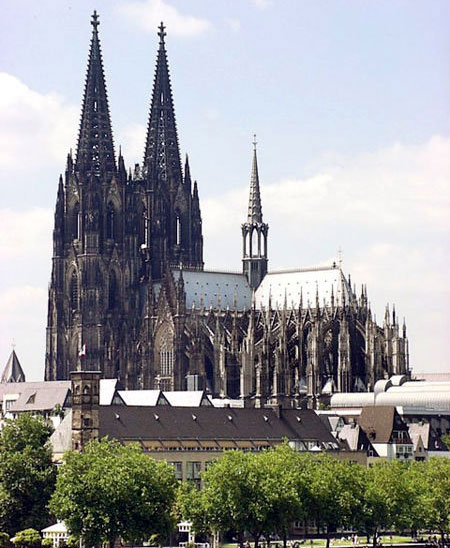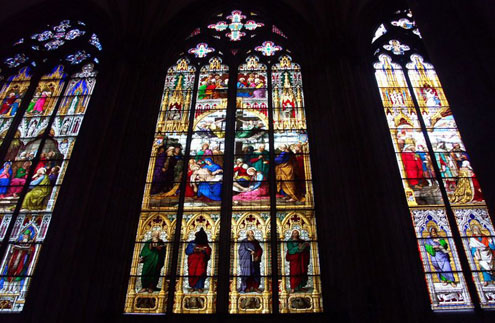Harry Peyton Steger had arranged to spend the summer of 1905 with a family in Bonn, Germany. No one in the family spoke English and Steger expected to be fluent in German in a matter of weeks. His training actually began en route, because no one on the German vessel knew more than a few words of English.
"I have, consequently, been enabled, perforce, to learn more German than otherwise," Harry wrote to his parents in Bonham. "In fact, I can ask for anything I want now. By the end of summer I shall be able, beyond a doubt, to speak German with ease."
Bonn is an historic city, dating back to the first century, BC, with the remnants of a sprawling Roman fortress, the largest known Roman fort from ancient times, covering 250,000 square meters. The fort appears to have had military significance to the Western Roman Empire until the mid-5th century AD.
In 1794, Bonn was made part of the First French Empire when the city was seized by French troops, but, 20 years later, as a result of the Napoleonic Wars, Bonn became part of the Kingdom of Prussia. Then in 1871, less than 35 years before Harry Peyton Steger arrived, Bonn was made part of the German Empire during the unification of Germany.
Steger was instantly mesmerized.
"The beautiful and famous old city of Koln (Cologne) is only a few miles away," Harry writes back to his folks in Fannin County. "Bonn itself is a beautiful old town of, say, 70,000 people, delightfully situated on the River Rhein. Here is the swellest of the great German universities."
Steger was struck by the immense and dramatic architecture. Two things quickly caught his eye: Germans had an elevated appreciation of art and sculpture was everywhere. Beautiful sculpture becomes so common that you expect to see it on their fences, Harry tells his parents, and shrubbery adorns the landscape as well as almost every man's upper lip.
"We have, by actual count, seen only five men without mustaches," Steger writes. Some of them are poor little emaciated fuzzy affairs that seem reluctant and coy; but the shrubbery is on every lip."
And what they couldn't grow on their lip, they were growing in the countless manicured gardens that dotted the countryside.
Steger said you could put a German in outer space with a bathtub full of dirt and he would grow enough cabbage and grapes to satisfy the stomach, not to mention a section for geraniums to sooth the soul. Then he would antique the bathtub, adorn it with sculpture, put on a little classical music and celebrate the occasion with a beer.
Although slightly smaller than Texas, Germany had 15 times as many people. Harry found the landscape divided as precisely as a checkerboard and he found a thrifty people with their own advanced version of what we today like to call "Fannin County friendly."
"Polite!" Steger exclaimed. "The Germans are so polite that at times it wears on a nephew of Uncle Sam. If you ask a German anything on the street, he is sure to stop, bow, remove his hat, give you, in toto, if he can, all the information for which you have asked, to bid you good day and leave you, an astounded Yankee, with your mouth open. There is no rush, no hurry, no worry. An evening's stroll through any German town will show cozert garden after cozert garden crowded with men, women and children. What are they doing? They are drinking beer and enjoying classical music! There is less disturbance, less noise, however, than in an average hotel lobby in America. Many are the tales we all have heard about Germans and their beer. Their tales are not exaggerated. The beer, of course, is not the injurious stuff that has made Milwaukee famous; for German Lager contains but little alcohol."
Harry had always enjoyed a good smoke and a glass of wine, when his limited finances would allow. One of the many rewards of the elusive Rhodes Scholarship was that Steger was now earning a $1,500 stipend annually, enough to finance his European travels, particularly when you consider the price tags catching Steger's eye in 1905. Fine Rhein wine was sold on street corners for 12 cents a bottle, a good cigar would set you back 3 cents - the same amount as a pound of luscious grapes - and the finest tailor-made suits went for $10.
Suffice to say, Harry was happy.
"I was never more uniformly cheerful in my life," Steger wrote to his sister. "I am disgustingly, offensively, monotonously happy."
One sight proved to be rather curious to the Fannin County native; Germans utilized dogs as draft animals to pull peddler's wagons containing milk and fruit.
"Often the vehicles are large and cumbrous and heavy," Harry relays to the folks back home, "but the dogs all seem fine and strong and willing."
After initially immersing himself in the population, Steger turned his attention to some world famous attractions in the area, beginning with the visually stunning Cathedral of Cologne.

This colossal monument to Christianity and Gothic architecture was started in 1268 and only finished, after a variety of interruptions, in 1882. The Cathedral of Cologne was the tallest structure in the world until the completion of the Washington Monument in 1884. And, as if the 1268 starting date wasn't mind boggling enough, this site had previously been the location for a Roman temple built by Mercurius Augustus.

"Even its exterior stones all show careful and minute hand-carving," Harry writes to his parents. "When you enter the gigantic structure and walk through the long, broad corridors, a wave of cold, musty air strikes you. It strikes you as a draught from the grave. Here and there, every 50 feet or so, shining dimly in the ghostly dark, are candled shrines. The odds are that every shrine will show you several penitents seeking forgiveness at the feet of Mary's statue; and, if you watch these folks as they leave the Cathedral, you will see them all dip their fingers in one of the many bowls of holy water that deck the exit - water that may be full of germs, tadpoles and grosser impurities, but water that has been blessed by a priest and so is holy. Last week we climbed the Kreuzberg, a small mountain here, and wandered through a graveyard, where Schumman, the great composer is buried, where Beethoven, Schiller's wife and child all sleep."
Seventy percent of the population was Catholic and another fundamental difference between America and Germany was that the German government owned railroads, coalmines, the telegraph and many other industries. Steger questioned the populace and found that most felt the inherent problems associated with government ownership paled in comparison to the dangers of large greedy corporations and trusts.
Germans also exhibited a great deal of admiration for their government, although the governor didn't enjoy that level of praise. Many said the Kaiser talked too much.
"Is the Kaiser better than you?" Harry asked a policeman -- adding, in parenthesis -- (Oh, I've acquired brass!).
"Yes," came back my answer from out of the eaves of a ten-pound helmet, Steger recalled. "He is, as Kaiser, for God has willed to him the emperorship of Germany. Personally, he and I are both men."
But, along with the verdant beauty and soul-stirring architecture came ominous tones. Trouble was brewing.
Harry watches maneuvers featuring 4,000 German cavalrymen and armored horsemen.
The German Empire had only been unified for 35 years, but a wave of nationalism was sweeping over the countryside.
"America is the dump-pile for Germany," Harry was told flatly, "because no good German every leaves Germany."
"France is not going to pull England's chestnuts out of the fire," was another common declaration during the summer of 1905.
Another sentiment expressed on several occasions stuck with Steger: "If war with England should come,” the German men would remark, “I would be in soldier's uniform in 24 hours."
Previous Steger articles:
http://www.ntxe-news.com/artman/publish/article_86954.shtml
http://www.ntxe-news.com/artman/publish/article_86956.shtml
http://www.ntxe-news.com/artman/publish/article_86957.shtml
http://www.ntxe-news.com/artman/publish/article_86955.shtml
http://www.ntxe-news.com/artman/publish/article_86965.shtml
http://www.ntxe-news.com/artman/publish/article_87117.shtml
http://www.ntxe-news.com/artman/publish/article_87118.shtml
http://www.ntxe-news.com/artman/publish/article_87121.shtml